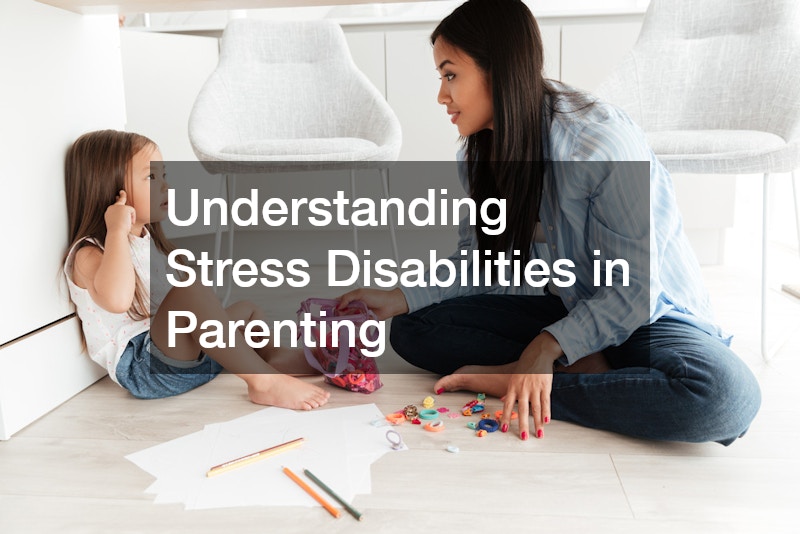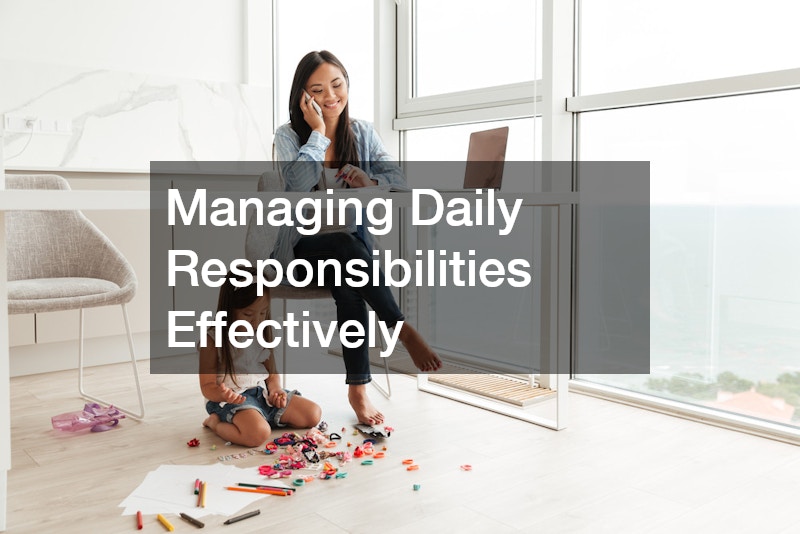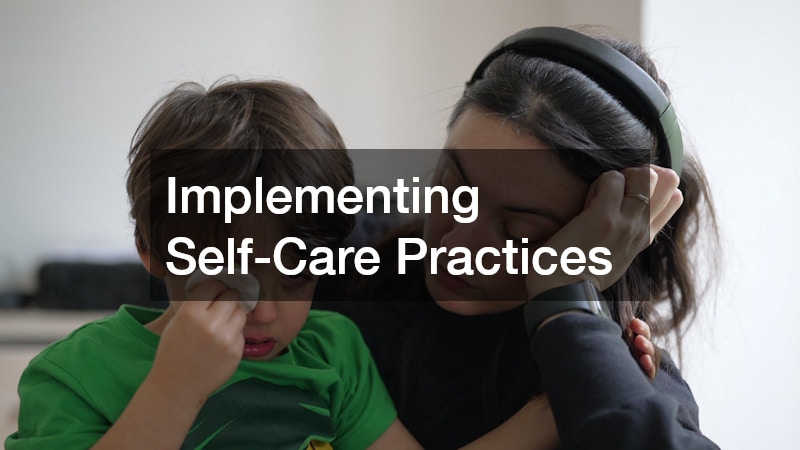Parenting is widely recognized as one of life’s most rewarding experiences, yet it can also be a source of significant stress. For parents living with a stress disability, the daily demands of raising children while managing emotional and physical strain can feel overwhelming. Stress disabilities can manifest in a variety of ways, including anxiety, fatigue, difficulty concentrating, and challenges in maintaining routines. Understanding these experiences is crucial for creating supportive environments for both parents and children. While every parent faces obstacles, those with a stress disability often need tailored strategies to navigate responsibilities, maintain well-being, and foster healthy family dynamics.
The effects of stress disability are not limited to the individual—they ripple throughout the family unit. Children can sense when a parent is struggling, which can impact their emotional development and behavior. Parents may feel guilt, frustration, or even isolation as they try to balance their needs with the demands of family life. Recognizing the importance of intentional coping strategies and external support is key. With the right combination of awareness, resources, and practical approaches, parents can successfully manage their stress disability while nurturing a stable and loving household.
Understanding Stress Disabilities in Parenting

Living as a parent with a stress disability often requires a deeper understanding of one’s own limitations and triggers. Stress disabilities can stem from chronic stress, mental health conditions, or physiological factors, and they influence the way parents respond to everyday challenges. Many parents struggle with managing household responsibilities, attending to children’s needs, and maintaining emotional balance. A stress disability does not diminish a parent’s love or capability; rather, it highlights the need for adaptive strategies and self-awareness to maintain both personal health and family well-being.
One practical way to manage these challenges is through chiropractic care, which can help alleviate physical tension and improve overall stress response. Chiropractic care is particularly valuable for parents experiencing musculoskeletal strain from carrying children, performing repetitive household tasks, or enduring sleep disruption. Regular chiropractic visits can support posture, reduce chronic pain, and enhance energy levels, making daily parenting duties more manageable. By integrating physical health management into a broader strategy for coping with a stress disability, parents can create a foundation that supports both their well-being and their ability to engage fully with their children.
Recognizing Signs of Parental Stress
Parents with a stress disability may notice subtle or pronounced signs of strain that affect both themselves and their family environment. Common indicators include irritability, persistent fatigue, difficulty focusing, and emotional fluctuations. Recognizing these signs early is crucial because unmanaged stress can exacerbate the challenges of parenting and potentially affect relationships with children and partners. Understanding personal stress patterns allows parents to implement preventative strategies before stress reaches overwhelming levels.
Seeking professional counseling can provide specific tools and techniques for identifying and addressing stress disability in the parenting context. Counseling offers a structured environment to explore triggers, develop coping strategies, and receive support in managing emotions and daily responsibilities. Parents can learn stress-reduction exercises, communication techniques, and behavioral interventions that directly translate into calmer and more effective parenting. By combining self-awareness with professional guidance, families can reduce the impact of stress disability while promoting healthier interactions and more resilient household routines.
Managing Daily Responsibilities Effectively

Parents living with a stress disability often find that everyday tasks, from meal preparation to school drop-offs, can feel overwhelming. Without careful planning and adaptive strategies, these responsibilities may contribute to heightened stress and feelings of being constantly behind. Developing a clear structure and prioritizing tasks can make a noticeable difference in managing both household and parenting demands. This approach helps parents feel more in control, reduces anxiety, and ensures that essential activities are completed without unnecessary strain.
Utilizing resources like a trusted family dentist can also support parents’ overall management of responsibilities. Regular dental check-ups for children and adults prevent minor issues from becoming major disruptions, allowing parents to focus on other tasks without the added stress of unexpected dental emergencies. Integrating routine healthcare into daily planning not only protects physical health but also reduces mental strain, giving parents with a stress disability more energy and focus to handle their responsibilities effectively.
Establishing Support Networks
A strong support network is crucial for parents with a stress disability. These networks can include family members, friends, community groups, and professionals who understand the challenges of parenting under additional stress. Having reliable support reduces feelings of isolation, provides emotional reassurance, and allows parents to delegate tasks when needed. Support networks also offer practical solutions, such as childcare assistance or advice on coping strategies, which can make daily life more manageable.
Connecting with specialized services like memory care providers can be an important aspect of broader support networks, especially for parents caring for children or elderly family members with cognitive challenges. Memory care professionals offer guidance, resources, and structured programs that ease caregiving responsibilities and reduce stress. By incorporating these targeted supports into their network, parents with a stress disability can better manage competing demands while ensuring that all family members receive the attention and care they need.
Implementing Self-Care Practices

Self-care is a critical component for parents living with a stress disability, yet it is often overlooked due to busy schedules. Effective self-care involves more than occasional breaks; it includes consistent practices that promote mental, emotional, and physical well-being. Examples include regular exercise, mindfulness techniques, adequate sleep, and balanced nutrition. Prioritizing self-care allows parents to replenish energy reserves, manage stress responses, and model healthy habits for their children.
Engaging in services like medical weight loss treatment can complement broader self-care routines by addressing physical health and boosting confidence and energy levels. Such treatments provide structured support and professional guidance tailored to individual needs, helping parents achieve sustainable health improvements. For parents with a stress disability, integrating focused medical care with everyday self-care practices strengthens resilience, improves mood, and enhances the ability to meet parenting challenges with patience and clarity.
Balancing Work and Family Life
For parents with a stress disability, juggling professional obligations alongside parenting responsibilities can be a significant source of strain. The pressure to perform effectively at work while attending to children’s needs often leads to fatigue, decreased focus, and increased anxiety. Establishing boundaries, planning schedules, and setting realistic expectations are essential strategies for maintaining a healthier balance. Recognizing that perfection is unattainable and prioritizing tasks based on urgency and importance can reduce the compounding stress that often accompanies dual responsibilities.
Incorporating resources like assisted living services for elderly family members or dependents can significantly ease this balancing act. Assisted living options provide professional support for those who require daily care, giving parents the freedom to focus on both work and their immediate family without compromising quality care. For parents managing a stress disability, leveraging such resources reduces emotional and physical strain, allowing them to maintain more stable routines and foster a supportive environment both at home and at work.
Communicating Needs With Family Members

Effective communication is vital for parents with a stress disability, as it allows family members to understand challenges, offer support, and collaborate on solutions. Without open dialogue, misunderstandings may arise, increasing stress levels and creating tension within the household. Clearly expressing needs, setting expectations, and actively listening to children and partners encourage cooperation and promote emotional well-being. Transparent communication also fosters trust and resilience, ensuring that the family can work together to address challenges in a constructive manner.
Engaging with retirement communities can offer parents insight into structured communication strategies, particularly when managing intergenerational households or providing care for aging relatives. These communities often provide educational programs, family counseling, and workshops that emphasize effective dialogue, conflict resolution, and shared responsibilities. By learning from these environments, parents with a stress disability can improve their communication skills, strengthen family relationships, and create a household atmosphere that reduces stress and promotes harmony.
Accessing Professional Resources
Parents with a stress disability often benefit from tapping into specialized professional resources to support both their well-being and their parenting roles. These resources may include healthcare providers, therapists, social workers, or educational consultants. Accessing professional guidance not only provides practical solutions for managing daily stressors but also offers emotional support, validation, and personalized coping strategies. Knowing where to seek help and how to navigate these resources can empower parents to take proactive steps toward maintaining balance and stability.
For example, monitoring health conditions with tools like diabetic strips can be an essential part of managing chronic medical needs while parenting. Parents with a stress disability who also manage diabetes can prevent health complications by regularly checking blood glucose levels and adjusting lifestyle or treatment plans accordingly. This proactive approach reduces unexpected health crises, supports consistent energy levels, and allows parents to engage more fully with their children while managing the ongoing demands of their stress disability.
Developing Coping Strategies
Coping strategies are essential tools for parents living with a stress disability. These strategies can range from mindfulness exercises and time-management techniques to structured routines and adaptive parenting approaches. Developing effective coping mechanisms helps parents manage emotional fluctuations, maintain energy, and reduce feelings of overwhelm. A well-rounded set of strategies also allows parents to respond to challenging situations calmly and intentionally, which benefits both their well-being and their family dynamics.
Using products like a wheelchair accessible crib can be a practical component of developing coping strategies for parents with mobility challenges. Such adaptive equipment allows parents to care for infants safely and comfortably, reducing physical strain and lowering stress levels. By integrating thoughtfully designed tools with broader coping practices, parents with a stress disability can maintain independence, support their physical health, and provide attentive care without compromising their own well-being. Parents can benefit from techniques such as journaling, guided meditation, and structured problem-solving exercises to process stress and maintain emotional equilibrium. Joining support groups or connecting with other parents who experience similar challenges can also provide validation, encouragement, and practical advice.
Promoting Long-Term Emotional Well-Being
Maintaining long-term emotional well-being is a critical goal for parents with a stress disability. Sustained emotional health allows parents to engage with their children meaningfully, manage daily responsibilities effectively, and enjoy a higher quality of life. Key components include regular self-reflection, stress management techniques, and access to supportive networks. Establishing habits that reinforce emotional stability is not a one-time effort but an ongoing practice that evolves with changing life circumstances.
Consulting with experts in disability law can further support emotional well-being by ensuring that parents understand their rights and access necessary accommodations. Legal guidance can help parents navigate workplace policies, educational needs, and healthcare considerations specific to their stress disability. By addressing these structural and legal factors, parents can reduce anxiety related to potential barriers, focus on their families, and build a sense of security that underpins long-term mental and emotional health.
Maintaining Balance and Well-Being as a Parent
Parenting with a stress disability presents unique challenges that require thoughtful planning, proactive strategies, and consistent support. While stress can affect emotional, physical, and relational aspects of life, parents who actively seek resources, develop coping mechanisms, and prioritize self-care can create a balanced and nurturing environment for themselves and their children. Understanding one’s limitations, communicating effectively with family, and integrating professional and practical resources all contribute to a more manageable and fulfilling parenting experience.
The journey of parenting with a stress disability is about resilience and adaptation. By recognizing signs of stress, establishing support networks, and leveraging both healthcare and adaptive tools, parents can reduce the impact of stress on daily life. Prioritizing emotional and physical well-being allows families to thrive, and children benefit from witnessing their parents’ commitment to health, self-care, and thoughtful parenting. With intentional strategies and the right support systems, parents living with a stress disability can lead empowered, balanced, and joyful family lives.
Building long-term emotional well-being also involves cultivating a sense of personal fulfillment outside of parenting responsibilities. Engaging in hobbies, pursuing education or career goals, and connecting with peer support groups can provide parents with a renewed sense of purpose and identity beyond caregiving. For those living with a stress disability, setting aside time for these activities may require intentional planning, but the benefits are significant: improved mood, reduced anxiety, and a greater capacity to handle parenting challenges.

